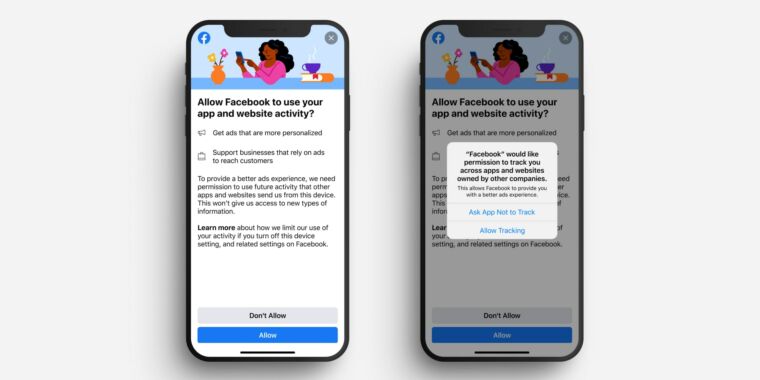
Today, Facebook began testing prompts for iPhone and iPad users advocating the importance of being tracked by the social network for the benefit of small businesses that use their advertising tools.
The test is in response to Apple’s plan to require the user to accept IDFA (ID for advertisers) tracking on all iOS, iPadOS and tvOS apps, starting with new software updates expected in the spring.
According to CNBC, Facebook will anticipate the required pop-up from Apple with its own on the affected devices. The Facebook message aims to persuade users not to opt for tracking.
Apple has previously announced that, with upcoming software releases, applications that use IDFAs to track users on apps and websites will have to show a pop-up that says, for example, “Facebook would like permission to track you on applications and sites owned by other companies. ”
This prompt will also be presented with a brief synopsis from the application manufacturer to clarify the case within this confirmation box (Facebook goes with “This allows Facebook to provide you with a better ad experience”). This is followed by two options: “Ask the application not to track” and “Allow tracking”.
The Facebook app on iOS and iPadOS will serve this mandatory dialog, but Facebook is testing another message that will appear before users even see this. The copy obtained by CNBC reads:
Allow Facebook to use your app and website activity?
- Get more personalized ads
- Support companies that rely on ads to reach customers
To provide a better ad experience, we need permission to use future activities that other apps and websites send us from this device. This will not give us access to new types of information.
The sample language we have here may not be definitive, and Facebook may be testing various versions of the message to determine which approaches are most effective in keeping users who have opted in to tracking.
Facebook had previously purchased a full-page ad in the newspaper with similar messages, arguing that the move would be particularly negative for local companies struggling during the pandemic. “In addition to damaging applications and websites, many in the small business community say that this change will be devastating for them as well, at a time when they face enormous challenges,” he said. “Small businesses deserve to be heard. We are facing Apple for our small business customers and our communities.”
Last week, Facebook CEO Mark Zuckerberg told investors on the company’s quarterly earnings conference call that they should expect a reduction in the company’s advertising revenue as a result of Apple’s policy change, because many, if not most, of users, opt out when presented with the choice. He also said that Apple’s decision to require user acceptance for IDFA tracking is one of many examples of Apple’s involvement in anti-competitive and monopolistic practices.
That same week, a report was published in The Information that detailed Facebook’s plan to file an antitrust lawsuit against Apple over this issue, as well as the supposed preferential status that Apple gives its iMessage platform (a competitor of Facebook Messenger) and Facebook WhatsApp) on iOS and iPadOS.
In addition, in the same week, Apple CEO Tim Cook delivered a speech at a data privacy conference in Brussels, in which he claimed that companies like Facebook are “built on deceptive users, on data exploitation, in choices that are not options “and that business models like Facebook cost” polarization, loss of confidence and, yes, violence “.
Apple plans to start requiring opt-in notification on all applications using IDFAs sometime this spring, and Facebook plans to honor the choices of iOS and iPadOS users as soon as they are made – at least, as long as the policy of Apple did not tipped in a growing storm of antitrust complaints.
